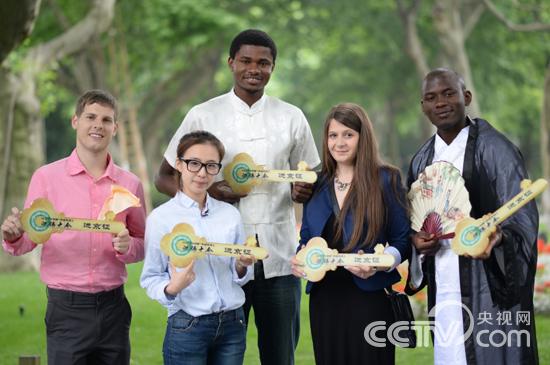
And the Battle Begins!
But don’t think that this was just tourism! To the contrary, each voyage was one of three matches for the final qualifications. But before describing the real “battle,” I would like to mention the competition’s opening ceremony, held in the Yuelu Academy, home to one of China’s oldest universities, in Changsha. Founded in 976, the academy is a historical monument and Confucian symbol of academic excellence. The contestants, garbed in folk costumes, were led through three courtyards at the academy where traditional ceremonies were performed. At the end of the process was the “pen opening” ritual, a Confucian tradition symbolizing the beginning of education, presided over by famous calligrapher Fan Zeng. He introduced the participants to calligraphy and Confucian philosophy. The phrase chosen for the occasion was Zhi Xing He Yi, “put your learning into practice.”
The race began after the history- and culture-laden opening at the tranquil institute of learning. Only 94 of the original 126 candidates made it to the second round of competition, soon reduced to 30, six for each of the five continents. The contestants continued to further trials, with more winnowed out each time. Only five survived to reach the finale.
Laughter and Emotions
Enough on this ruthless linguistic duel! Let’s look at the moving and humorous side of the contest. During the outdoor contest, the candidates had help from the locals, but also fell into traps set by the organizers. In Anhua, for example, before learning how to make a brick of compressed black tea, candidates were asked to sell tea to tourists. Each group had an object to help them, if they knew how to use it. One group was given a wedding dress ... But that didn’t unsettle the Singaporean candidate, who wore it to the delight and laughter of all around. With the dress fluttering around him, he extolled the health benefits of black tea and successfully sold several bricks.
During the challenge at Xi’an, the Brazilian candidate had to sell small replicas of terra cotta soldiers. But the crew sabotaged them, sending a couple of disguised tourists to argue in front of the stall and smash the statuettes. How could she repay the shop owner for a dozen statues dashed to smithereens? In flawless Chinese she simply ordered the crazy couple to “repay these damages immediately!”
In the round at Jingdezhen, the Zimbabwean candidate learned that notions of time and space in China are different from his own country. After getting lost in the urban treasure hunt, he asked for directions from an old Chinese man who responded, “It’s not far, maybe 50 or 60 meters.” The delighted contestant proudly advanced, feeling himself close to victory and forgetting about the Chinese love for euphemisms. After 50 meters without reaching the goal, he panicked and started running through the streets, quickly getting lost again.
The summer heat also put the candidates to the test, several of whom fainted in the course of filming. As the contest crew went looking for help, other candidates gathered around, some wielding a fan and others spraying water on their unconscious teammates. A touching bond was thus formed in an unexpected crisis.
The grand finale, held on set one month after the competition opened, was eagerly viewed by a huge television audience. On the theme “the Silk Road, a lifeline between China and the world,” the grandiose show was very well run, and impressive for the technical expertise and the number of extras engaged in the spectacle. Winners from all the continents participated in the great tableau. There were elements of all the previous challenges: porcelain, martial arts, tea, Tang Dynasty politics and so on. The five contestants also had to answer the final questions posed by the jury. Among the jurors were the director of Croatia’s Confucius Institute; film star Tang Guoqiang, who frequently portrays Mao Zedong on screen; and Hai Xia, the CCTV presenter. The viewing public voted on the competition, and the jury’s commentary served only as advice.
Finally, the Brazilian candidate took the first place. She had the honor of being the first Latin American to win the honor. Xu Jialu, the contest’s founder, gave her the prize and congratulated her on her success. Despite the challenges and difficulty of the competition, in the end it is the smiles and joy of candidates at being in China and learning Chinese that is most important.
We Recommend:
